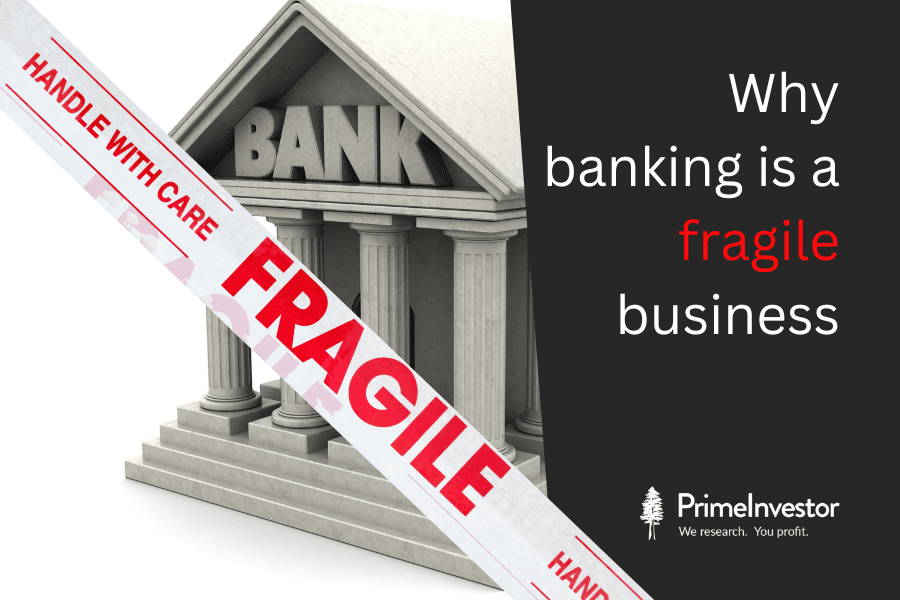The recent furore surrounding the failure of Silicon Valley Bank in the US has exposed that while banking is a favourite sector with stock market investors, the fragility of the banking business is far from well-understood. Banks are held up as the engines of economic growth. Whichever sector grows, the banking sector ultimately gains. Banks are also accorded a higher valuation than most sectors during bull phases. In good times, banks made up a 40% plus weight in our leading stock market indices.

True, banks are vital to the economy in the sense that they are the lifelines of business and people. Central banks tightly govern banks to make sure that they can remain solvent and that depositor money is always protected.
But what is less-known is that banking is also a business built on the foundations of blind faith. It rests on borrowing short-term money from depositors and deploying this in longer term loans or investments. So long as the deposits keep growing and a bank’s loans plus investments are lower than its deposits plus borrowings plus capital, there is public confidence in banks.
But on any given day, there is only so much cash available for withdrawal. If a lot of depositors decide to pull out money, the bank cannot liquidate all investments or recall all loans in full at short notice. Most often, banks’ loan books keep growing as long as its clients keep growing. Thus, technically, at any given point in time, if there is a rush of depositors at the door, any bank can go bust. Not just the ‘badly run’ ones.
Shareholders in the dock
In the tug-of-war between depositors and borrowers, shareholders of a bank can get a raw deal. There are two ways in which an investment in a bank stock can go bad for a shareholder. One is when the loans given out do not come back and are sufficiently large to wipe out the shareholder money. If it was a non-bank, it would end up in an insolvency court and the shareholders would take the hit as would the depositors and lenders. However, we have not witnessed a bank landing in the insolvency courts. This is because the central banks do not want a crisis of confidence.
When banks default, there is a big risk of contagion. It could spread to the entire system and cause governments to fall. So, what is done is that the central bank does a corporate re-structuring (an arranged marriage or a swayamwar) such that perhaps the shareholders and the lenders lose, but never the depositor. Legally, deposits in excess of Rs. 5 lakh (the present Deposit Insurance Cover offered by DICGC which is wholly owned by the RBI) are not insured. In the US, the present limit is $250,000 per depositor per bank.
But even large depositors in big banks are usually protected by taxpayer money. I do not recall any instance of even the US letting down its depositors, while shareholders and bond-holders could have been wiped out. No politician will risk losing an election by letting depositors lose money. In the case of the Silicon Valley Bank (SVB) even when over ninety percent of the deposits were from hot-shot depositors and start-ups with over $2,50,000, the US Fed thought it fit to bail them out. In India, we have had repeated instances of the government pumping in capital to keep PSU banks alive after bad loan issues, while tottering private banks have been merged or taken over overnight.
SVB has highlighted a new route through which banks can go bust. Their loan book was not bad. But accounting laws were liberal enough to permit banks to hold investments without marking them to market, as interest rates surged. SVB had a surge in deposits and could not lend immediately. So it put the money into government paper when interest rates were very low. As rates rose dramatically, selling this paper to meet deposit redemptions, resulted in a big loss. Thereafter, word of mouth was enough to create a run on the bank.
But SVB may not be alone, as a sudden surge in interest rates (the tightening after the easing) can hurt anyone with a sizable holding in long-term bonds. Some estimates put the mark-to-market losses at US banks due to rising rates at $700 billion. Is it not amazing that the biggest proponents of capitalism, when it comes to saving their own skins, feed off the exchequer? Banks in India have time and again lost capital from bad loans and frauds. I do not know of any bank that went into trouble because of rate risks.
Banks as investments
On a steady-state basis, banks should not hold much attraction to equity investors as investment candidates, because earnings growth will not be great. In terms of ROE, the best run banks struggle to get to 20 per cent. Banks are also heavily regulated. Right from CEO appointments to payment of dividend, everything is subject to central bank approval.
In India, we are fortunate to see listed banks which are also financial conglomerates, owning a range of subsidiaries dabbling in everything in finance – insurance, mutual funds, stock broking, investment banking, non-banking finance, housing finance and so on.
Today, Indian banks are retail-focused. To add that kicker to the P&L, they need to take higher risks, milk the customer for fee income and depend on areas that are removed from the normal business of lending and deposit taking. Risk management has become an art and hedging currency and interest rate risks have become extremely important.
Lending skills (something that government-owned banks seem to deliberately be light on) are very critical in this trade-off between risk and reward. Top rated borrowers go to the bond markets for their large needs, so banks in their search for higher yields, push the risk boundaries.
As an investor, it is extremely tough to trust bank balance sheets. Firstly, banks disclose much less than other sectors. I cannot have a detailed list of their loans or investments. We have to trust that the RBI has the wisdom to inspect these. Auditing a bank is a tremendous challenge and it is more a matter of faith than science when an auditor signs off on the accounts.
How do I know that a bad loan has not been ‘ever greened’ by giving it a higher limit so that it looks like a great credit? How did Nirav Modi get so much money from the banks? How do banks write off crores of rupees, when you and I can never sleep over a few thousand rupees of loss? How many bankers have been punished for frauds? We will chase a Mallya and a Nirav Modi, but how many senior bankers are behind bars for giving them the loans?
The takeover of Credit Suisse has happened. A 160-year old bank has paid billions in fines for so many wrongdoings over the years. And a news clipping tells me that Credit Suisse bankers will be getting their bonuses for the year!
So what does all this mean for bank investors or depositors or lenders?
Depositors
While it is true that no depositor in India has SO FAR lost any money because of a commercial bank failing, it is very unwise to presume that it will always be so. Just a year or two ago, there was an attempt by the government to push through a regulation which would have meant that depositors would have had to sacrifice some part of their deposits to save a bank.
The deposit insurance limit is just Rs 5 lakh. My view is that deposits in PSU banks will be safe. There could be some delays, but when political capital is at play, tax payer money will be used to bail out the PSU banks, for sure. Of course, if they go about privatizing these banks, the risk changes.
I would be cautious about keeping large amounts as deposits, in excess of insurance limits, in small private banks or cooperative banks. Here the risk of banks coming under some regulatory sword is high and deposits can be ‘frozen’ for a very long time. It is better to keep minimum amounts in cooperative or small banks and larger amounts in PSU banks from a safety perspective.
Yes, some private sector banks have become ‘too big to fail’ – like ICICI or HDFC or Axis. As a measure of prudence, I would use more than one bank to spread my risk.
Shareholders
Bank shareholders are in the hot seat when a bank runs into turbulence of any kind that threatens the depositor. One should fully expect the shares to go to zero. Except in some cases of negotiated merger or takeover, capital tends to be written down to zero, to rescue other stakeholders.
Lenders
A retail investor ends up lending to a bank when he or she buys Tier 1 bonds issued by it. I will never buy any AT1 bond or ‘perpetual’ bonds as they are called. A lure of two or three percent over fixed deposit interest rates is not enough. The RBI has the power to extinguish these bonds.
In the first place, perpetual means there is no redemption (such bonds usually carry call options but no put options), and is like a gift to the bank. Interest payments are subject to the bank making money and also getting approval from the RBI to pay interest. The liquidity of the bond depends on the health of the bank. Should the bank be in trouble, no one will touch the bonds. I would leave this instrument to knowledgeable money-lender investors, if there is such a breed.





6 thoughts on “Why banking is a fragile business”
Bala Sir,
Couple of questions related to the deposit insurance concept:
(i) If a person wishes to keep 25L in banks then why should it matter whether she keeps 5L each in 5 banks or 25L in one bank? The total insurance coverage available to the deposits increase as we spread the capital across multiple banks. It seems odd.
(ii) In addition to the coverage given by DICGC, why can’t banks or depositors get deposit insurance on their own? Given the complexity of today’s environment and speed with which events unfold, additional insurance or reinsurance by banks or depositors could be of great utility in keeping the banking system stable.
Another question is significance of the ‘Domestic Systemically Important Banks’ status that RBI gives to banks. Currently SBI, HDFC Bank, and ICICI Bank are accorded the D-SIB status. Would it imply that deposits in these banks are safe (or relatively safer than other banks)? Or even in these banks anything above 5L is under the sword of Damocles?
Hi Yogesh,
1. There is no clear answer. From a practical point of view, I think the big banks will not be let down by the government. The idea behind limited insurance cover is to say that we hope that not all the eggs will spoil at the same time.
2. Insurance to a depositor is still not available. Maybe someone will come up with that.
Giving deposit insurance to an individual would expose the insurance co to very high risk. Again the premiums may vary from one bank to another and keep going higher as amounts rise. Also, not aware of any other country where such a facility is available.
Excellent Article
Hi PI Team,
This article very well explains the risks in lending business. Given this fact, should PI re-consider stock recommendations in some banks , NBFC businesses and ETFs? We have lot of other sectors to invest, no?
I know you folks are vigilant but is it worth the risk?
Thanks
Vasanth
Banks will tend to be rewarding for stock investors. A reasonable allocation is surely a fair proposition. If we can minimise the quality risk, we are ok. This is my personal view. I have been an investor in HDFC Bank since its IPO. I also love companies like Sundaram Finance.
Thanks Bala sir.
Comments are closed.